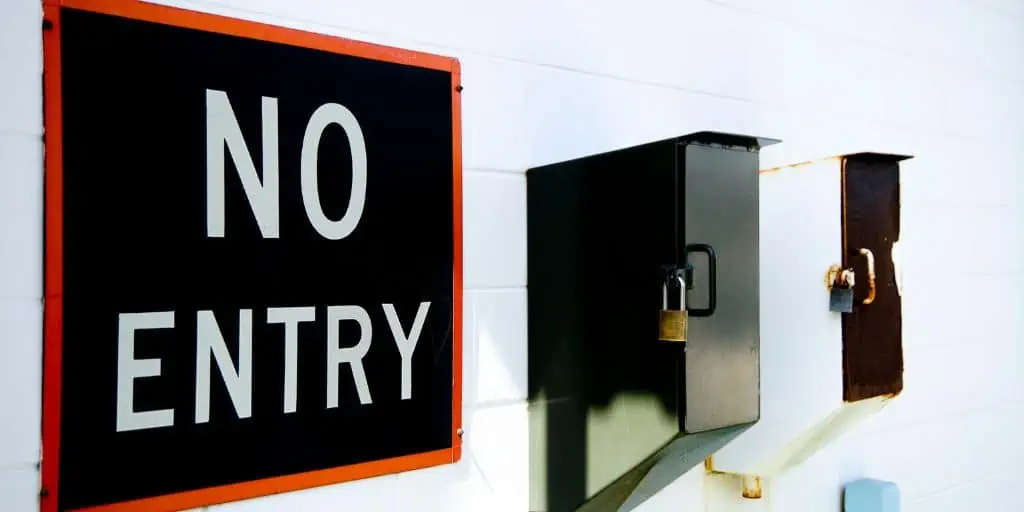What Are Covenants, Conditions, and Restrictions (CC&Rs)?
REtipster does not provide legal advice. The information in this article can be impacted by many unique variables. Always consult with a qualified legal professional before taking action.
What Are Examples of CC&Rs?
Examples of CC&Rs cover a range of different things, from the exterior paint color of houses to waste disposal methods, vehicle parking, and utilities a homeowner should use[1].
Perhaps the most common provision in CC&R agreements is what community members can and cannot do to their exterior and front lawn. This includes what color the owner can paint the house, what roof shingles are allowed, what type/how tall the fencing can be, or what kind of siding can be installed.
These rules typically cover landscaping regulations such as vegetation and trees homeowners can plant on their lawns and even a specific length of grass[2] before it needs to be mowed.
Other common CC&R provisions are the types of pets residents can keep, where residents and guests can park their cars, whether people can conduct businesses out of their home, and when (and where) people can have parties.
Some homeowners’ associations (HOAs) also enforce CC&Rs for interior decorations, although these provisions are often the most controversial. For example, an HOA may require homeowners to obtain express approval before making any major interior renovations or additions, which are sensible. Still, some HOAs take it further by decreeing interior paint, window treatments or curtains, and more.
CC&Rs are filed with the county clerk upon drafting. In many cases, CC&R regulations “run with the land”, which means they persist even after the subject property is sold to another owner[3].
CC&Rs vs. Zoning Ordinances
Many owners confuse CC&Rs with zoning ordinances, but the difference is that CC&Rs are private regulations for an HOA community, while zoning is a local, state, or federal regulation limiting the use and development of real estate in a particular area.
Typically, an HOA or a group of property owners can create and enforce the CC&Rs. Local governments are usually not involved in drafting these rules unless a major violation or a dispute occurs.
On the other hand, zoning ordinances are recorded as local laws[4]. This means they are rules that everyone in the area needs to follow and observe, and they are enforced by governmental groups, not private individuals or neighborhood associations.
Another significant difference between CC&Rs and zoning ordinances is that CC&Rs are voluntary. When a person chooses to buy a house, they choose to agree and sign off on the covenants, conditions, and restrictions that the neighborhood has agreed on. Because these guidelines are voluntary and written by private groups, CC&Rs tend to be more restrictive than zoning ordinances.
How Are CC&Rs Enforced?
Private entities, like an HOA, create and enforce a community’s CC&R agreements in the Declaration of Covenants, Conditions, and Restrictions[5]. An HOA is a group of neighborhood residents responsible for caring for the community’s shared spaces.
If a resident violates one or more of the provisions outlined in a CC&R, the HOA usually starts by giving the homeowner a written or verbal warning. If the resident wants to refute the warning or defend themselves, there may also be a hearing at the next planned community meeting. If there has to be a hearing, it will usually be settled with a vote that any residents can participate in.
Depending on the nature of the violation and the individual homeowner’s association policy, there may also be a penalty.
If the problem persists despite the HOA’s warning, the association can take legal action against that resident. As long as the agreement was signed as a binding contract, a court of law will enforce the agreement, and it could even result in the homeowner losing their property.
Penalties for CC&R Violations
Penalties may depend on the owner’s violation and the specifics of the corresponding penalty in the CC&R agreement.
The most common type of penalty is a verbal or written notice. This is the association’s first step when a resident breaks the agreement, which is usually sufficient notice for the homeowner to rectify the issue.
However, if the homeowner does not fix the violation, the association may move on to other, more severe types of penalties.
More severe types of penalties include a fine. The fine may be a one-time charge or it could be a fine that grows the longer the homeowner goes without fixing the problem. Some HOAs may also hire a third party to resolve the non-CC&R-compliant issues and then charge the individual homeowner for the cost of labor and materials.
Other associations may temporarily revoke community privileges until the problem is fixed. This could include access to the pool, gym, or clubhouse.
To enforce penalties beyond fines or revoked privileges, the homeowners’ association may involve the courts by filing a lawsuit. This could result in more drastic actions against the resident or property owner like higher fines, vehicle or property impoundment, or even a lien or foreclosure[6], which may vary depending on state law. This course of action also means private parties will incur legal fees.
Pros and Cons of CC&Rs
In general, the pros and cons of CC&Rs are identical to the advantages and disadvantages of living in a community with a homeowners’ association.
Here are some of the major ones.
Pros
The biggest pro of CC&Rs is protecting and preserving property value because CC&Rs mandate uniformity and maintenance[7]. For example, if a neighborhood, street, or adjacent lot is well-maintained, it generally keeps the price of the property higher for the next owner of the house, if the original residents want to sell the property.
Another benefit to the homeowner is that neighborhoods with CC&R agreements often have shared facilities, such as pools, gyms, clubhouses, playgrounds, and courts. These amenities add value to properties in that community, and CC&Rs enforce shared responsibility among homeowners to take care of these spaces.
Cons
CC&Rs are, by nature, prohibitive. In addition, many homeowners prefer to avoid being told what they can and cannot do to their property, especially if the provisions set limitations on interior decoration and design.
These agreements can also significantly extend the time it takes to do any renovation project and may even add to the cost. An HOA’s CC&R often includes renovation and remodeling rules and may ban additions completely. In addition, some will ask for special assessments and approval fees before greenlighting the project.
Finally, some CC&Rs may designate provisions for limiting rentals[8]. In most cases, the CC&Rs may limit which rooms can be rented, for how long, what tenants can do, or even ban rentals completely.
Takeaways
- Covenants, Conditions, and Restrictions (CC&Rs) are agreements drawn up between groups of homeowners or a homeowners’ association that state what other residents can and cannot do with any property located in that community.
- CC&Rs lay out provisions for various things, including landscaping, house exteriors, waste disposal, pet regulations, parking for residents and guests, and more.
- When homeowners violate CC&R provisions, they usually receive a verbal or written warning and/or a small fine, but the homeowner association can take residents to court if violations persist.
- In many communities with an HOA and a corresponding CC&R document, property values are kept high because of the care and property maintenance required of all community members.
- Many homeowners also lament CC&R agreements because they tend to be restrictive.
Sources
- CC&R Enforcement and Remedies. (2021, December 10.) FindLaw. Retrieved from https://www.findlaw.com/realestate/owning-a-home/cc-r-enforcement-and-remedies.html
- What Are The Pros And Cons Of Covenants, Codes And Restrictions? (n.d.) First Federal Bank. Retrieved from https://cbcnationalbankmortgage.com/what-are-the-pros-and-cons-of-covenants-codes-and-restrictions/
- Covenants, Conditions, and Restrictions. (2022, July.) Legal Information Institute, Cornell Law School. Retrieved from https://www.law.cornell.edu/wex/covenants_conditions_and_restrictions
- CC&R Basics. (2023, January 4.) FindLaw. Retrieved from https://www.findlaw.com/realestate/owning-a-home/cc-r-basics.html
- Dehan, A. (2021, November 1.) CC&R: Covenants, Conditions, And Restrictions Explained. QuickenLoans. Retrieved from https://www.quickenloans.com/learn/covenants-conditions-restrictions
- Loftsgordon, A. (n.d.) I’m behind in HOA dues but not my mortgage. Can the HOA foreclose? Nolo. Retrieved from https://www.nolo.com/legal-encyclopedia/im-behind-hoa-dues-mortgage-can-the-hoa-foreclose.html
- Fontinelle, A. (2022, September 12.) 9 Things to Know About Homeowner Associations. Investopedia. Retrieved from https://www.investopedia.com/articles/mortgages-real-estate/08/homeowners-associations-tips.asp
- Ross, B. (n.d.) Can I Rent Out My House in a Community Governed by a Homeowners’ Association? Nolo. Retrieved from https://www.nolo.com/legal-encyclopedia/restrictions-renting-your-home-planned-unit-development.html












